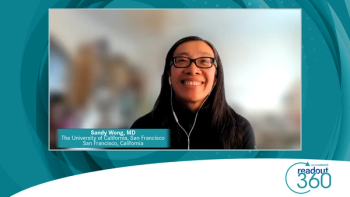
Sandy Wong, MD, and Alexander Lesokhin, MD, discuss how they approach the treatment of transplant-eligible NDMM using the Dara-RVd regimen.

Your AI-Trained Oncology Knowledge Connection!


Sandy Wong, MD, and Alexander Lesokhin, MD, discuss how they approach the treatment of transplant-eligible NDMM using the Dara-RVd regimen.
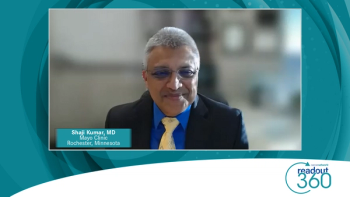
Shaji Kumar, MD, presents updated data from the GRIFFIN trial investigating combination daratumumab, lenalidomide, bortezomib, and dexamethasone for the treatment of transplant-eligible newly-diagnosed multiple myeloma (NDMM).
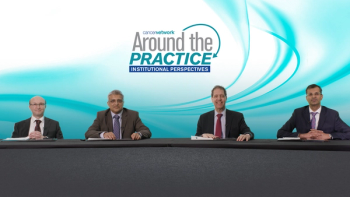
Broad discussion on novel therapies, including bispecifics and CAR-T therapies, that are evolving the treatment landscape of multiple myeloma.

Panelists take a broad look at treatment selection and sequencing through multiple lines of therapy in patients with multiple myeloma.

Moving to the last patient case of newly diagnosed multiple myeloma, expert panelists work together to define patient frailty in this setting and discuss how frail patients are treated in practice.

Shared insight on optimizing selection and use of daratumumab-containing regimens in NDMM, with regard for clinical trial readouts in this setting.

Experts review a second patient case wherein transplant-ineligible newly diagnosed multiple myeloma was treated with the daratumumab, lenalidomide and dexamethasone regimen and how updated data from the MAIA trial can be incorporated into clinical practice.

Considerations for assessing eligibility of patients for transplantation for NDMM and how maintenance therapy may be initiated in the post-transplant setting.

Centering discussion on a patient case of transplant-ineligible newly diagnosed multiple myeloma, experts consider how they would approach workup and management.

Comprehensive insight on optimizing newly diagnosed multiple myeloma management, ranging from response assessment to use of consolidation and maintenance therapy.

Shared insight on the GMMG-HD7 study, which utilized a frontline isatuximab-containing quadruplet regimen in patients with newly diagnosed multiple myeloma.

Expert perspectives on frontline daratumumab-containing quadruplet regimens in the context of recent clinical trials in newly diagnosed multiple myeloma.
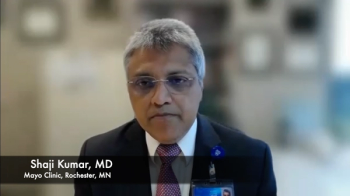
At EHA 2021, Shaji Kumar, MD, reviews the toxicity profile of daratumumab plus lenalidomide and dexamethasone for patients with transplant-ineligible multiple myeloma in the first-line setting.

At ASCO 2021, Shaji Kumar, MD, talked about the impact of adding daratumumab maintenance to therapy for patients with newly diagnosed multiple myeloma in the CASSIOPEIA trial.

At EHA 2021, Shaji Kumar, MD, reflects on the significance of 5-year data from the MAIA study of a daratumumab combination in patients with multiple myeloma.

At EHA 2021, Shaji Kumar, MD, reflects on the significance of 5-year data from the MAIA study of daratumumab plus lenalidomide/dexamethasone in patients with newly diagnosed multiple myeloma.

Shaji Kumar, MD, talks about 5-year follow-up data regarding the use of daratumumab, lenalidomide, and dexamethasone in patients with multiple myeloma who are not eligible for transplant.
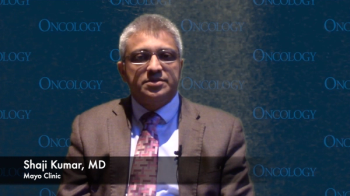
The Mayo Clinic expert spoke about stem cell transplantation for patients with myeloma and the factors that affect the ability to collect stem cells.

Multiple myeloma (MM) remains incurable despite the current approaches used in initial therapy, including more effective induction therapy, one or more autologous stem-cell transplants, and consolidation/maintenance strategies.

Our better understanding of the complex interaction of multiple myeloma (MM) cells with their bone marrow microenvironment and the signaling pathways that are dysregulated in this process has resulted in a dramatic increase in the therapeutic agents available for this disease. A number of these new agents have demonstrated significant activity in patients with MM. Over the past 5 years, three drugs have received approval from the US Food and Drug Administration for therapy in MM—bortezomib, thalidomide, and lenalidomide. To date, the choice of therapy for MM is not individualized according to the biologic characteristics of the disease, but future studies should enable us to identify patients who may benefit most from certain therapeutic interventions, and thus develop individualized therapy for MM. In this review, we will present some of the treatment algorithms currently developed for patients with MM and focus on established advances in therapy, specifically with thalidomide, bortezomib, and lenalidomide. We will also discuss some of the emerging novel therapeutic agents showing promise in phase I/II clinical trials in MM.